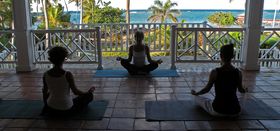Caribbean Retreat Seeks To Help Clinicians With Healing and Wellness

American clinicians have long been at odds with chronic pain. With 11.2% of the population affected by the condition and an opioid crisis making headlines across the nation, our approach to it is evidently ineffectual. Chronic pain’s complexity appears to grow with each discovery. Clinicians now understand that, in addition to demonstrable physical and neurological damage, many cases of pain may stem from emotional issues. This relationship may explain the popularization of complementary medicine remedies such as yoga and mindfulness. Further exploration of the mind’s role in pain may reveal a promising avenue for newer, safer treatments.
The Emotional Aspect of Pain
“Centrally amplified pain” refers to that which cannot be tied to tissue or nerve damage. Clinicians increasingly attribute this condition to increased perception of pain rather than actual injury. Anxiety issues are linked to disordered regulation of cortisol, a hormone associated with threat response; erratic spikes and dips in its levels can cause widespread inflammation and pain. This irregularity may explain why some report increased pain at night — excessive daytime cortisol may lead to rapid decrease at bedtime, increasing sensitivity to pain and external stimuli.
The issue goes even deeper. Chronic pain itself can cause anxiety, creating a vicious cycle that interferes with sleep and daytime function.
Complementary Medicine for Anxiety Management
While clinicians can’t pin all centrally amplified pain on anxiety disorders, these findings could help us create a more comprehensive approach to the issue. There is evidence showing the effectiveness of both yoga and mindfulness meditation as pain and anxiety management methods. Clinicians may also consider prescribing antidepressants before turning to riskier pharmaceuticals.
Reflect, Relax, Renew
A Healing Workshop for Physicians, Dentists, Therapists, Teachers and Healers
The prevalence of chronic pain may seem overwhelming, but as trials reveal more evidence for alternative treatments, complementary medicine appears ever more promising. By working together, primary care physicians, psychiatrists, mindfulness experts, and lifestyle coaches  may be able to create thorough and safe pain management strategies, decreasing our reliance on opioids. If you seek a mental break or want to take time to let go of stress, Metro Collaborative invites all to a Collaborative Retreat, August 25th-29th and October 27th -31st. Stay at the lovely Villa Serena. Here you will experience a sense of community, nature and a physical connection while working to let go of old patterns of reacting to stress. You will learn to:
may be able to create thorough and safe pain management strategies, decreasing our reliance on opioids. If you seek a mental break or want to take time to let go of stress, Metro Collaborative invites all to a Collaborative Retreat, August 25th-29th and October 27th -31st. Stay at the lovely Villa Serena. Here you will experience a sense of community, nature and a physical connection while working to let go of old patterns of reacting to stress. You will learn to:
- Meditate, draw, contemplate, move and be still.
- Share, or not.
- Take nature walks
- Generate growth and resilience
- Focus on well-being
For more information, visit the website, check out the video below, or email info@villaserena.com.
Metro Collaborative® is an East Coast-based collective bringing together clinicians from mainstream and alternative medicine. Their dinners and retreats advance the medical community’s dialogue on topics such as pain management and clinician burnout while helping practices secure valuable referrals. Call them at (212) 777-8949 or visit their website to RSVP to their next event.
About the Business
Have a question? Ask the experts!
Send your question

